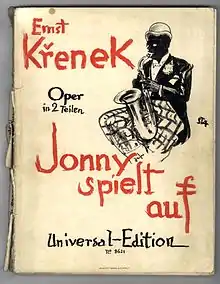Jonny spielt auf
Jonny spielt auf (Jonny Strikes Up) is a German-language opera with words and music by Austrian composer Ernst Krenek about a jazz violinist. The work typified the cultural freedom of the 'golden era' of the Weimar Republic.
| Jonny spielt auf | |
|---|---|
| Opera by Ernst Krenek | |
 Title page of the 1926 vocal score (1st edition) | |
| Translation | Jonny Strikes Up |
| Librettist | Krenek |
| Language | German |
| Premiere | |
Performance history
It was premiered at the Neues Theater, the predecessor to the Leipzig Opera, on 10 February 1927 and was quickly adopted by opera houses across Germany, where it was performed 421 times on various stages during its first season alone. It provided Krenek with the financial security to be able to devote all his time to composing. It was staged in 42 opera houses, including at the Metropolitan Opera in New York City on 19 January 1929 where it was given under Artur Bodanzky with Florence Easton, Edytha Fleischer, Walter Kirchhoff, Michael Bohnen and Friedrich Schorr. The libretto was translated into 14 languages. It was the first opera performed by Swiss tenor Hugues Cuénod.[1]
Nevertheless, with the rise of the Nazi movement, the opera encountered hostility in Vienna in 1927–1928 from Nazi sympathisers. The magazine Vogue described the scene in spring of 1928:
In Munich, for instance, the opera-house was closed to it, and, to be presented at all, it had to go to the Gaertner Platz Theater. At the first performance, angry witnesses threw evil-smelling devices. At the second, ironic partisans of Hitler unloosed a cageful of white mice. After the show, crowds in the street outside threatened the audience for having willingly looked upon the "Black Shame!"[2]
The same protests occurred several years later in Munich. After the National Socialists attained power in Germany, they banned the opera.[3] At the 1938 Entartete Musik exhibition in Düsseldorf, organiser Hans Severus Ziegler condemned the opera as the very archetype of Weimar decadence and used a racist and antisemitic caricature of one of the original promotional posters for the work from 1927 as the main promotional image for his exhibition.[4]
Roles
| Role | Voice type | Premiere cast, 10 February 1927[5] Conductor: Gustav Brecher |
|---|---|---|
| Anita, an opera singer | soprano | Fanny Cleve |
| Max, a composer | tenor | Paul Beinert |
| Daniello, a virtuoso violinist | baritone | Theodor Horand |
| Jonny, a black jazz band fiddler | baritone | Max Spilcker |
| Yvonne, a hotel chambermaid | soprano | Claire Schulthess |
| Hotel director | tenor | |
| Railway employee | tenor | |
| Artists' manager | tenor | |
| First policeman | tenor | |
| Second policeman | baritone | |
| Third policeman | bass | |
Recordings
- Decca 436 631-2: Alessandra Marc, Krister St. Hill, Michael Kraus, Maria Posselt, Andreas Korn, Gunar Kaltofen, Roald Reinecke, Dieter Scholz; Leipzig Gewandhaus Orchestra; Lothar Zagrosek, conductor[3]
- Vanguard Classics: Lucia Popp, Gerd Feldhoff, Thomas Stewart, Leo Heppe, Evelyn Lear; Vienna State Opera Orchestra; Heinrich Hollreiser, conductor
References
- Margalit Fox (7 December 2010). "Hugues Cuénod Dies at 108; Versatile, Light-Voiced Tenor". The New York Times.
- Sanborn, Pitts (October 27, 1928). "Metropolitan Novelties and Revivals of 1928–29". Vogue.
- Rickards, Guy, "Record Review" (December 1993). Tempo (New Ser.), 187: pp. 55–57.
- Richard S. Levy, Antisemitism: A Historical Encyclopedia of Prejudice and Persecution, Volume 1, ABC-CLIO, 2005, p. 476
- Casaglia, Gherardo (2005)."Jonny spielt auf, 10 February 1927". L'Almanacco di Gherardo Casaglia (in Italian).
Further reading
- Alexiadis, Minus I., (2000), Jonny spielt auf, (Unpublished Ph.D. dissertation, Athens University, Department of Music Studies, (in Greek language)
- Holden, Amanda (ed.), Viking Opera Guide, Viking, 1993
- Purkis, Charlotte (1992), "Jonny spielt auf" in The New Grove Dictionary of Opera, ed. Stanley Sadie (London) ISBN 0-333-73432-7
- Stewart, John L., Ernst Krenek: The Man and His Music. University of California Press, 1991 ISBN 0-520-07014-3, 0-520-07014-3
- Taylor-Jay, Claire, The Artist-Operas of Pfitzner, Krenek, and Hindemith: Politics and the Ideology of the Artist, Aldershot: Ashgate, 2004.
- Tregear, Peter, Ernst Krenek and the Politics of Musical Style, Maryland: Scarecrow Press, 2013.
- Warrack, John and West, Ewan (1992), The Oxford Dictionary of Opera, 782 pages, ISBN 0-19-869164-5
- Wood, Ean (2000), The Josephine Baker Story, (p. 142) MPG Books, ISBN 1-86074-286-6